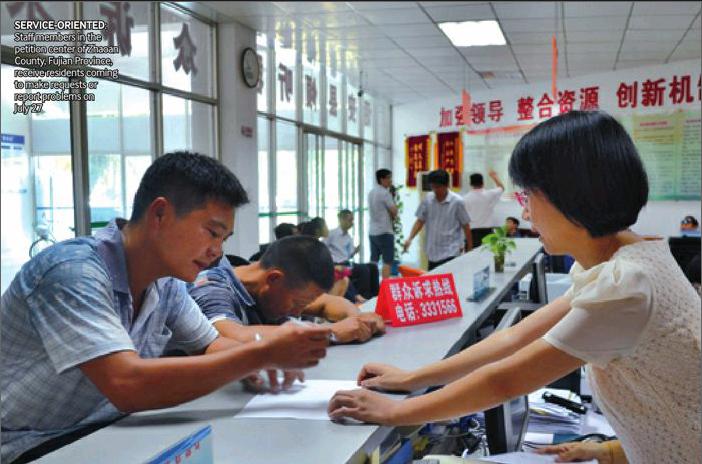Keen Listeners
2014-10-23ByLiuJian
By+Liu+Jian

In Chinas big cities, traditional funeral etiquette has been increasingly simplified, and people no longer follow many of the old funeral rituals. yet in the countrys vast rural areas, the funeral of a family member is still a huge event, with their offspring wanting to show their filial piety through their farewell to the deceased.
Before April 2013, residents in Lintou village, Sidu Town of Zhaoan County in east Chinas Fujian Province were vexed by the absence of an appropriate place for such funerals. They thought that holding such a service in open space would be offensive to people living in the vicinity, as superstition says a funeral in front of their homes could bring bad luck.
“Funerals not only consume a large amount of manpower and material resources, but also trigger disputes between neighbors,” villager Li Shundong told Beijing-based magazine ChinAfrica.
Near the Qingming Festival in 2013, or Tomb-Sweeping Day, Li and a few other villagers came to the village petition center to request the setting of such a place. Their request was recorded. Soon, they were invited to a village officials meeting. Two weeks later, they got a reply from the village petition center. In the ensuing five months, abandoned old houses in the center of the village were torn down and replaced with two new houses, which were designated as venues for such farewell ceremonies.
The local officials decision was applauded by the villagers, Li said. He said that since September 2013, more than 20 funerals had been held in the two facilities, with no disputes having since been reported.
Listening to the people
In an effort to improve local governmentsmanagement, officials in Zhaoan County are required to regularly meet with the people, listen to their opinions and solve their problems. Nanzhao Town, the seat of Zhaoan County, is divided into 13 sub-districts and two villages and has a population of 71,000. According to Xu Shuyi, deputy town chief and director of the township petition center, township leaders take turns to receive petitions at the center.
“Now, the local people have more channels to voice their need,” she said.
Designated staff members at the township petition center are expected to receive petitioners or their calls in a timely matter, patiently listen to their requests, and give a reply as soon as possible, Xu said. For matters beyond the purview of the township government, petitioners should be informed of the right procedures to follow. If a petitioner is not satisfied with the solution, he can petition again.
Standard procedure ensures effectiveness in petition handling, said Xu. In every stage of the petition handling process, certain persons and departments are held accountable, so as to ensure that problems reported by the public can be solved in a timely and effective fashion.
Xu said the county and township governments also hold regular meetings to study the petitions and seek solutions. This meeting is held by the county government at least once a month, by the township government at least once every two weeks, and by village leadership at least once every 10 days, she said.
service-oriented governing
With progress in petition handling has come an improvement in the work style of Zhaoan Countys officials.
“In Zhaoan, if any official still regards himself or herself as above others, then he or she is out,” Xu said.
In addition to the petition center, to better serve the people, Nanzhao Town has set up a one-stop service center, which makes it more convenient for residents to apply for various certifications, social insurance payments and other schemes. Such service centers have also been set up in the sub-districts and villages in the towns jurisdiction.
According to Xu, it is very convenient for local residents to put forward demands. “It is as easy as posting a microblog message,”she said.
The township petition center has publicized the contact information of officials responsible for handling petitions so that they can be accessed by the public at any time, even after work.
If a petitioners problem has been addressed, he or she will be immediately informed by the centers staff members. “A follow-up call makes us feel cared for,” said Li Shundong, villager in Lintou village.
“In the past, when we encountered any problem, we first went to the township police station. After the village got the petition center, we report a problem to a village official responsible for handling petitions,” Li said, who will help them solve problems, saving much trouble.
Liu Huawen, Deputy Director of the Center for Human Rights Studies of the Chinese Academy of Social Sciences, said the right to express oneself is an important facet of human rights, and Zhaoan Countys example should be followed.
Winning trust
Xie Tiangui, Party chief of Sidu Town, said that since the center in the town came into being, residents attitude toward the center has changed from skepticism into trust.
“When the center had just been set up, the public doubted how many problems we could solve through such a work method. After we solved some of their problems, they came to realize that we are doing serious work,” Xie said.
After serving as the director of Nanzhao Countys petition center for two years, Xu has keenly felt the importance of listening to the people and building trust. She said that careful and patient listening and frank communication can reduce the distance between people, and foster trust.
Sometimes, a problem may not be solved in a short time, but through communication, a petitioner may feel half of the bitterness pent up in their heart already gone, Xu said. “If the petition center is not able to solve a problem, we will help petitioners contact the relevant departments.”
Li Zhihong, Party chief of Lintou village, said that when local residents reported that a bridge to a local port was unsafe and hampered traffic, the village leadership raised funds to repair the road as soon as possible, and the 2-meter-wide road was broadened to 6 meters.
Statistics show that since 2012, governments of different levels in the county have received 7,174 petitions, and 6,026 cases have been settled.
“With a sound petition platform, people do not have to resort to other measures to solve their problems,” Xu said.
